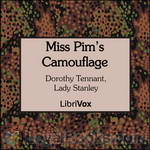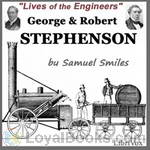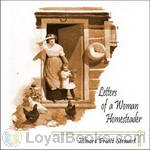|
Books Should Be Free Loyal Books Free Public Domain Audiobooks & eBook Downloads |
|
|
Books Should Be Free Loyal Books Free Public Domain Audiobooks & eBook Downloads |
|
Top Authors |
|---|
|
Book type:
Sort by:
|
By: Basil Joseph Mathews (1879-1951) | |
|---|---|
 Paul the Dauntless
Paul the Dauntless
“We shall in this book try to go in the footsteps of Paul. It will not be all easy traveling for any of us, to journey with this daring explorer of the Unseen; there is some steep hill-climbing, some scrambling over boulders, long flat tramps over the plain, and dangerous sea-journeys for anyone who will attempt really to follow the life of this man whose eager brain was ever ‘Voyaging on strange seas of thought/Alone!’ But, if you will … trudge by him till you really know him, you will have found for yourself one of the great companions of the world.” (From the Introduction) | |
By: Rebecca Harding Davis (1831-1910) | |
|---|---|
 Life in the Iron Mills
Life in the Iron Mills
This 1861 novella was the first published work by Rebecca Harding Davis: writer, social reformer, and pioneer of literary realism. It tells the story of Hugh Wolfe, a Welsh laborer in an iron mill who is also a talented sculptor, and of Deborah, the hunchbacked woman who unrequitedly loves him. | |
 Margret Howth, a Story of To-day
Margret Howth, a Story of To-day
| |
 Frances Waldeaux
Frances Waldeaux
| |
By: F. Marion Crawford | |
|---|---|
 Man Overboard
Man Overboard
Peculiar happenings aboard the schooner Helen B. Jackson when one night during a storm, the small crew found themselves diminished by one. Somebody had gone overboard, and it was surmised that it was one of the twin Benton brothers. But oddly enough, it seemed that the ‘presence’ of the missing twin continued to exist on board during the following weeks. For example, one extra set of silverware was found to be used after each meal, but nobody claimed to be using them. What then did happen that stormy night, and which brother, if indeed it was one of the brothers, was the man who went overboard? | |
By: Lady Dorothy (Stanley) Tennant (1855-1926) | |
|---|---|
 Miss Pim's Camouflage
Miss Pim's Camouflage
Mid-WWI, staid Englishwoman Miss Perdita Pim suffers a sunstroke gardening & gains the power of invisibility. She becomes a super-secret agent, going behind German lines, sometimes visible, sometimes not, witnessing atrocities & gleaning valuable war information. | |
By: Daniel A. Lord (1888-1955) | |
|---|---|
 Red Arrows in the Night
Red Arrows in the Night
The Scarlet Archer of Agincourt is claimed by the Erkenwold’s as their family ghost. Tradition held that the death of an important Erkenwold was always heralded by the apparition of the Scarlet Archer. Now in the early years of WWII, the archer has made an appearance on the family estate on the US coast. Is it a ghost or something more sinister, and what does he or she want?This mystery novel was written by Daniel A Lord, S.J., who was a popular American Catholic writer. The subjects of the works in his bibliography range from religion, humor, plays, songs, mysteries and even politics... | |
 Murder in the Sacristy
Murder in the Sacristy
A sacristan is found murdered in the sacristy and the safe robbed of valuable jewels. All clues seem to point to the priest as the murderer. But is the priest the guilty party - or is it the communist - the nazi - the Senator's wife - or someone else?This mystery novel, set in World War II Chicago, was written by Daniel A Lord, S.J., who was a priest and popular American Catholic writer. The subjects of the works in his bibliography range from religion, humor, plays, songs, mysteries and even politics. His most influential work was possibly in drafting the 1930 Production Code for motion pictures. (Introduction by Maria Therese) | |
By: Woods Hutchinson (1862-1930) | |
|---|---|
 Preventable Diseases
Preventable Diseases
| |
 A Handbook of Health
A Handbook of Health
The Woods Hutchinson Health Series, A HANDBOOK OF HEALTHBy Woods Hutchinson, A. M., M. D. PREFACE Looking upon the human body from the physical point of view as the most perfect, most ingeniously economical, and most beautiful of living machines, the author has attempted to write a little handbook of practical instruction for the running of it. And seeing that, like other machines, it derives the whole of its energy from its fuel, the subject of foods--their properties, uses, and methods of preparation--has been gone into with unusual care... | |
 The Child's Day
The Child's Day
The Child's Day, The Woods Hutchinson Health SeriesBy Woods Hutchinson, A.M., M.D. FOREWORD If youth only knew, if old age only could! lamented the philosopher. What is the use, say some, of putting ideas about disease into children's heads and making them fussy about their health and anxious before their time? Precisely because ideas about disease are far less hurtful than disease itself, and because the period for richest returns from sensible living is childhood--and the earlier the better. It is abundantly worth while to teach a child how to protect his health and build up his strength; too many of us only begin to take thought of our health when it is too late to do us much good... | |
By: Edward Streeter (1891-1976) | |
|---|---|
 Dere Mable
Dere Mable
Bill is in training camp, preparing to go off to World War I. This book is a collection of love letters written to his sweetheart, Mable. The letters are humorous, mis-spelled, and have many stories of life in an army camp – all from Bill’s unique perspective. | |
 "Same old Bill, eh Mable!"
"Same old Bill, eh Mable!"
| |
By: Peter Mark Roget (1779-1869) | |
|---|---|
 Roget's Thesaurus
Roget's Thesaurus
| |
By: Mamie Dickens (1838-1896) | |
|---|---|
 My Father As I Recall Him
My Father As I Recall Him
“If, in these pages, written in remembrance of my father, I should tell you, my dear friends, nothing new of him, I can, at least, promise you that what I shall tell will be told faithfully, if simply, and perhaps there may be some things not familiar to you.” So begins chapter one of My Father as I Recall Him, the personal recollections of Mary Dickens, (Mamie, as she was called), the oldest daughter of the great novelist, Charles Dickens. | |
By: Gaius Sallustius Crispus (Sallust) (86-34 BC) | |
|---|---|
 The Catiline Conspiracy and the Jugurthine War
The Catiline Conspiracy and the Jugurthine War
The Catiline Conspiracy and The Jugurthine War are the two separate surviving works of the historian commonly known as “Sallust”. Nearly contemporary to the events he describes, he is supposed to have been a retired officer of Caesar’s army. “Catiline” contains the history of the memorable year 63. Sallust describes Catiline as the deliberate foe of law, order and morality (although party politics may have influenced his view). Still, Sallust does recount Catiline’s noble traits, including his courage in the final battle... | |
By: Oliver Wendell Holmes | |
|---|---|
 The One-Hoss Shay
The One-Hoss Shay
This is a small collection of whimsical poems by the American physician and author Oliver Wendell Holmes, Sr. "The Deacon's Masterpiece" describes the "logical" outcome of building an object (in this case, a two-wheeled carriage called a shay) that has no weak points. The economic term "one hoss shay," referring to a certain model of depreciation, derives its name from this poem. "How the Old Horse Won the Bet" is a lighthearted look at a horse race. Finally, "The Broomstick Train" is a wonderfully Halloween-y explanation of how an electric tram really works. | |
 The Path of the Law
The Path of the Law
| |
 Autocrat of the Breakfast Table
Autocrat of the Breakfast Table
| |
 Medical Essays, 1842-1882
Medical Essays, 1842-1882
| |
 The Professor at the Breakfast-Table
The Professor at the Breakfast-Table
| |
 The Guardian Angel
The Guardian Angel
| |
 A Mortal Antipathy: first opening of the new portfolio
A Mortal Antipathy: first opening of the new portfolio
| |
 Oliver Wendell Holmes, Sr. Works
Oliver Wendell Holmes, Sr. Works
| |
 The Poet at the Breakfast-Table
The Poet at the Breakfast-Table
| |
 Grandmother's Story of Bunker Hill Battle as She Saw it from the Belfry
Grandmother's Story of Bunker Hill Battle as She Saw it from the Belfry
| |
 Ralph Waldo Emerson
Ralph Waldo Emerson
| |
 Images from Works of Oliver W. Holmes
Images from Works of Oliver W. Holmes
| |
 The Poetical Works of Oliver Wendell Holmes — Volume 01: Earlier Poems (1830-1836)
The Poetical Works of Oliver Wendell Holmes — Volume 01: Earlier Poems (1830-1836)
| |
By: Oliver Wendell Holmes, Sr. (1809-1894) | |
|---|---|
 My Hunt After 'The Captain'
My Hunt After 'The Captain'
Holmes describes his frantic search through Civil War torn landscapes for his wounded son, the future Supreme Court Justice. Originally published in The Atlantic Magazine, 1862. Holmes, Sr. (1809 -1894) was an American physician, poet, professor, lecturer, and author. He was regarded by his peers as one of the best writers of the 19th century. His most famous prose works are the "Breakfast Table" series, which began with The Autocrat of the Breakfast Table (1858). He is also recognized as an important medical reformer. | |
By: Oliver Wendell Holmes (1809-1894) | |
|---|---|
 Over the Teacups
Over the Teacups
| |
 John Lothrop Motley, A Memoir
John Lothrop Motley, A Memoir
| |
 Our Hundred Days in Europe
Our Hundred Days in Europe
| |
By: Harry Leon Wilson (1867-1939) | |
|---|---|
 Merton of the Movies
Merton of the Movies
Merton of the Movies is a comedy that centers around Merton Gill, an aspiring dramatic artist from Simsbury, Illinois who makes his way to Hollywood to become a serious actor. How could Merton fail in attaining his dreams after finishing a correspondence course from the General Film Production Company of Stebbinsville, Arkansas, certifying him to be a competent screen actor? Harry Leon Wilson, the author, was a very popular humor writer in the first decades of the 20th century. This book was made into film several times, the last in 1947 starring Red Skelton. | |
 The Seeker
The Seeker
| |
 The Boss of Little Arcady
The Boss of Little Arcady
| |
 The Spenders A Tale of the Third Generation
The Spenders A Tale of the Third Generation
| |
 The Lions of the Lord A Tale of the Old West
The Lions of the Lord A Tale of the Old West
| |
 The Wrong Twin
The Wrong Twin
| |
 Somewhere in Red Gap
Somewhere in Red Gap
| |
 Ma Pettengill
Ma Pettengill
| |
 Ewing's Lady
Ewing's Lady
| |
By: Frederick Litchfield | |
|---|---|
 Illustrated History of Furniture
Illustrated History of Furniture
From the Earliest to the Present TimeBy Frederick Litchfield.PREFACE.In the following pages the Author has placed before the reader an account of the changes in the design of Decorative Furniture and Woodwork, from the earliest period of which we have any reliable or certain record until the present time. A careful selection of illustrations has been made from examples of established authenticity, the majority of which are to be seen, either in the Museums to which reference is made, or by permission of the owners; and the representations of the different interiors will convey an idea of the character and disposition of the furniture of the periods to which they refer... | |
By: Samuel Smiles (1812-1904) | |
|---|---|
 Lives of the Engineers (George and Robert Stephenson)
Lives of the Engineers (George and Robert Stephenson)
George Stephenson did not invent the steam engine, that was due to Newcomen and later to James Watt. He did not invent the steam locomotive, that was due to a number of people including Cugnot, Trevithick and others. He did not invent the Railway. Railways or tramways had been in use for two hundred years before Stephenson.The reason why Stephenson was known as ‘The father of the steam locomotive’ was that he took a primitive, unreliable and wholly uneconomic device and turning it into an efficient... | |
 Men of Invention and Industry
Men of Invention and Industry
| |
 The Life of Thomas Telford; civil engineer with an introductory history of roads and travelling in Great Britain
The Life of Thomas Telford; civil engineer with an introductory history of roads and travelling in Great Britain
| |
 The Huguenots in France
The Huguenots in France
| |
 A Boy's Voyage Round the World
A Boy's Voyage Round the World
| |
 Jasmin: Barber, Poet, Philanthropist
Jasmin: Barber, Poet, Philanthropist
| |
 A Publisher and His Friends Memoir and Correspondence of John Murray; with an Account of the Origin and Progress of the House, 1768-1843
A Publisher and His Friends Memoir and Correspondence of John Murray; with an Account of the Origin and Progress of the House, 1768-1843
| |
By: Elinore Pruitt Stewart (1878-1933) | |
|---|---|
 Letters of a Woman Homesteader
Letters of a Woman Homesteader
The writer of the following letters is a young woman who lost her husband in a railroad accident and went to Denver to seek support for herself and her two-year-old daughter, Jerrine. Turning her hand to the nearest work, she went out by the day as house-cleaner and laundress. Later, seeking to better herself, she accepted employment as a housekeeper for a well-to-do Scotch cattle-man, Mr. Stewart, who had taken up a quarter-section in Wyoming. The letters, written through several years to a former employer in Denver, tell the story of her new life in the new country... | |
 Letters on an Elk Hunt
Letters on an Elk Hunt
This is a sequel to Letters of a Woman Homesteader in which Elinore Rupert (Pruitt) Stewart describes her arrival and early years on a Burntfork Wyoming ranch in 1909-1913. The letters are written to her elderly friend, Mrs. Coney, in Denver. In the present collection of letters, Elinore describes a lively excursion on horseback and wagon into the Wyoming wilderness during July-October 1914. Her traveling companions are her husband “Mr. Stewart,” their three oldest children, and kind-hearted, opinionated neighbor Mrs... | |
By: James Branch Cabell (1879-1958) | |
|---|---|
 The Certain Hour
The Certain Hour
| |
 Domnei A Comedy of Woman-Worship
Domnei A Comedy of Woman-Worship
| |
 The Cords of Vanity A Comedy of Shirking
The Cords of Vanity A Comedy of Shirking
| |
 Chivalry
Chivalry
| |
 The Jewel Merchants A Comedy in One Act
The Jewel Merchants A Comedy in One Act
| |
 Figures of Earth
Figures of Earth
| |